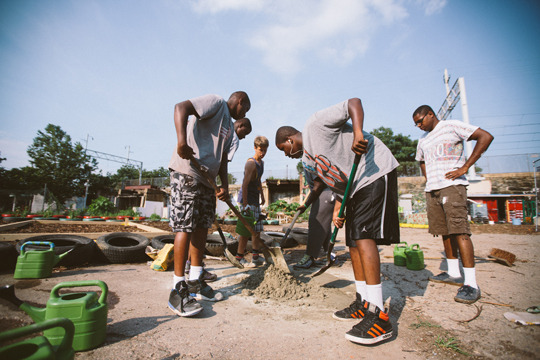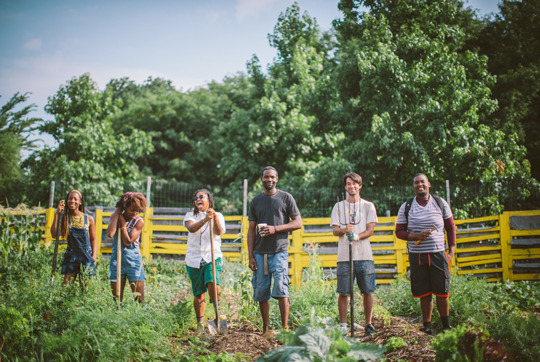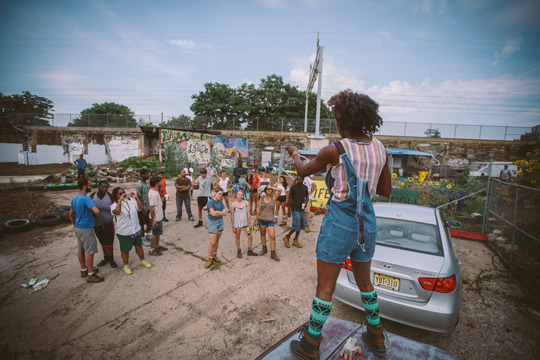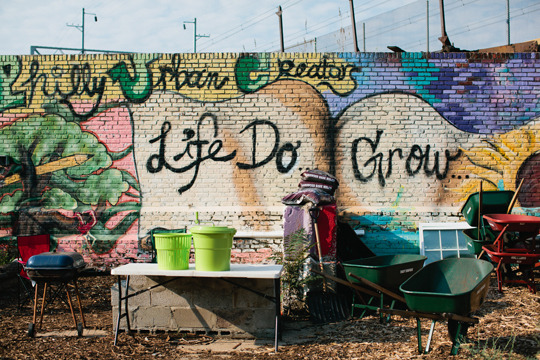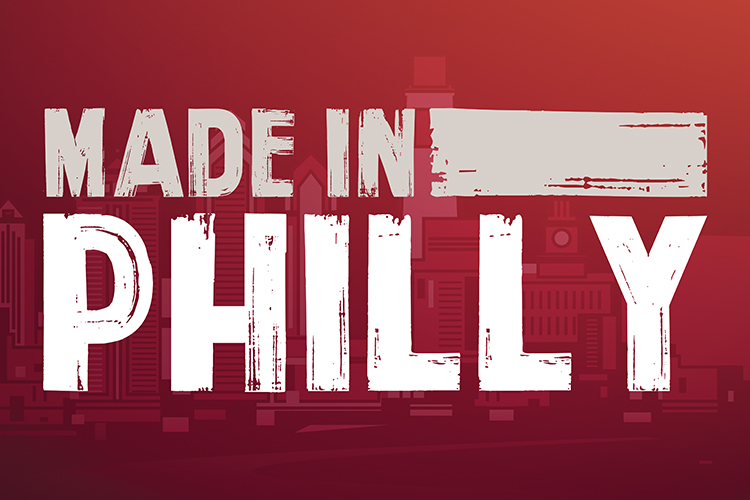Philadelphia Urban Creators enact their bold plan
to educate, energize, empower and unite
Along 11th Street in North Philadelphia, a short drive from City Hall, are blocks of crumbling rowhomes and crowded public housing apartments, interrupted by the conspicuously new townhomes and condos of Temple University students. Vacant lots abound, edged by rickety fences and rife with weeds and litter. A few parks stand eerily empty, their rusty basketball hoops and crumbling concrete a testament of neglect. In the middle of it all stands a most unlikely neighbor: a farm.
 Troi Lauren Nichols, left, and Jeannine Kayembe share a light moment after wrapping up a tour of Life Do Grow farm.A chain-link fence surrounds the lot where a warehouse once stood. Inside, a graffiti mural painted over a brick wall proclaims the farm’s name, Life Do Grow. This property, at 11th and Dakota Streets, is the beating heart of the Philadelphia Urban Creators (PUC), a nonprofit organization striving to enrich the lives of North Philadelphia residents through urban agriculture.
Troi Lauren Nichols, left, and Jeannine Kayembe share a light moment after wrapping up a tour of Life Do Grow farm.A chain-link fence surrounds the lot where a warehouse once stood. Inside, a graffiti mural painted over a brick wall proclaims the farm’s name, Life Do Grow. This property, at 11th and Dakota Streets, is the beating heart of the Philadelphia Urban Creators (PUC), a nonprofit organization striving to enrich the lives of North Philadelphia residents through urban agriculture.
It’s an unexpected burst of life in the middle of the neighborhood.
When 22-year-old New York City native Alex Epstein, one of PUC’s six co-founders, first arrived at Temple as a freshman, he says, “At orientation, they kept telling us not to go into North Philly, that it was too dangerous.” Epstein, who had organized several high school volunteer trips to New Orleans, was no stranger to blight, and saw the neighborhood as an opportunity for growth. “The idea of moving into a community that wasn’t mine and not interacting with it was absurd,” he says. “That’s not why I came here.”
The first inklings of the PUC surfaced in 2010 when Epstein gathered a group of 18 teenagers, Temple students and North Philadelphia residents to volunteer at Our School at Blair Grocery (OSBG), an urban farm and education center in New Orleans. That group included Jeannine Kayembe, a Los Angeles native who had moved to Philadelphia to pursue her career as a spoken-word poet, and then 14-year-old Denzel Thompson, who had met Epstein at an after-school program. In New Orleans’ Lower Ninth Ward, says Epstein, the North Philadelphia residents recognized many problems similar to their own at home.
“I’ll never forget this,” Epstein says. “The Philly crew was all playing basketball, and the New York kids were just kind of hanging out on the side, and there was a drive-by shooting right in front of the school where we were working. We saw a guy get shot and killed. And all of the New York kids, including myself, freaked out, and the Philly guys just kind of went on like nothing happened.”
“We hear gunshots all the time,” Thompson adds. “When I don’t hear gunshots, then I think something’s wrong.”
Sowing Seeds
When the group returned home, they started planning. First came more trips to New Orleans to work with OSBG founder Nat Turner and others helping to transform the post-Katrina landscape into a healthy, sustainable space. “There were evolutionary mindsets all around us,” Kayembe says. “We were watching people change the food system through organizing, through shared values.”
The PUC team spent nearly two years gathering interest and forming an identity. In addition to Epstein, Kayembe and Thompson, the core group of founders include Devon Bailey, a construction worker who owns an apartment and workspace across the street; Troi Lauren Nichols, a vocalist and dancer; and Golden Murray, a recreation therapy student at Temple.
In early 2011, the physical footprint of the farm was established. The Village of Arts and Humanities, a local nonprofit arts and culture organization, supported the establishment of PUC through a memorandum of understanding. The Village had worked with the Pennsylvania Horticultural Society and Philadelphia Parks and Recreation caring for the land on which PUC was established, as well other parks and gardens in the neighborhood. The founders and a crew of neighborhood volunteers began clearing, cleaning and building at the site, gathering discarded lumber, pallets and tires to build planters. Donations of paint, plywood and corrugated roofing helped to complete the first few structures. Life Do Grow was ready to live up to its name.
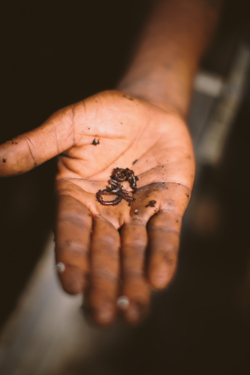 Devon Bailey shows off the farm’s hard working vermicomposters.In its first growing season, the farm produced tomatoes, peppers, string beans, collard greens, broccoli, mint and lettuce. PUC was able to host its first few small farmers markets, and even begin producing and selling salsa to nearby market Leotah’s Place. Now in its fourth season, the farm has expanded its harvest enough to offer a twice-weekly farmers market through the peak summer growing times.
Devon Bailey shows off the farm’s hard working vermicomposters.In its first growing season, the farm produced tomatoes, peppers, string beans, collard greens, broccoli, mint and lettuce. PUC was able to host its first few small farmers markets, and even begin producing and selling salsa to nearby market Leotah’s Place. Now in its fourth season, the farm has expanded its harvest enough to offer a twice-weekly farmers market through the peak summer growing times.
As Thompson, now 19, circles the lot, he points out feathery carrot tops, rainbow chard, sturdy kale, delicate asparagus sprouts and more. A vermiculture system creates compost from neighborhood food scraps. Rows of vegetables receive water from a homemade, gravity-powered irrigation system. Giant rain barrels stand all around the property so no water goes to waste.
Compost piles have been ingeniously placed around plastic-paneled plant houses, allowing the heat released from the composting process to warm the insulated structures. At the center of it all is a huge hoop house and accompanying solar panels, donated by Magic Johnson. In 2012, Kayembe won the athlete’s “What Inspires You?” video contest, and he sent materials and staff to North Philadelphia to erect the structure. The very next day, Hurricane Sandy tore it down. Johnson’s team, thankfully, returned to rebuild it.
 Denzel Thompson is honored by Queen Latifah after he won a TeenNick HALO award for his work with PUC.The following year, Thompson won the TeenNick HALO (Helping And Leading Others) award for his work with PUC. Over his four years with the organization, Thompson transformed from an obese, depressed eighth grader to an engaged, active teenager by learning to grow his own food. “That was a great point of me growing out of depression,” he says, “and actually enhancing myself.” He lost over 100 pounds along the way, and his metamorphosis helped him secure a grant from HALO and a surprise visit from Nick Cannon. At the awards show, aired on Nick at Nite, Queen Latifah honored Thompson. She told BET, “Denzel’s the one changing the world right now. … I’m really proud of him because when the world gets to see people like him, it shows that his generation is not just about texting all the time or doing a crazy dance. They have gifts and abilities, and they’re connecting people in a way that no other generation has been able to do.”
Denzel Thompson is honored by Queen Latifah after he won a TeenNick HALO award for his work with PUC.The following year, Thompson won the TeenNick HALO (Helping And Leading Others) award for his work with PUC. Over his four years with the organization, Thompson transformed from an obese, depressed eighth grader to an engaged, active teenager by learning to grow his own food. “That was a great point of me growing out of depression,” he says, “and actually enhancing myself.” He lost over 100 pounds along the way, and his metamorphosis helped him secure a grant from HALO and a surprise visit from Nick Cannon. At the awards show, aired on Nick at Nite, Queen Latifah honored Thompson. She told BET, “Denzel’s the one changing the world right now. … I’m really proud of him because when the world gets to see people like him, it shows that his generation is not just about texting all the time or doing a crazy dance. They have gifts and abilities, and they’re connecting people in a way that no other generation has been able to do.”
Growing the Business
Although grants have paved the way for PUC’s major accomplishments, the members are working to develop more sustainable long-term funding methods. The farm grows herbs, greens, sprouts and wheatgrass for a few local restaurants, including FUEL Philly and Kamal’s Middle Eastern Specialties. PUC also offers an Adopt-A-Greenhouse program, whereby restaurateurs and market owners can spend $2,000 to $3,000 up front to have a customized hoophouse built to house menu-specific produce. Iovine Brothers Produce has one such structure, where wheatgrass, microgreens and several different types of basil thrive away from hungry squirrels.
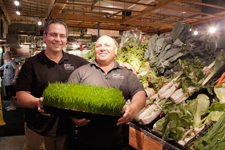 Vinnie and Jimmy Iovine, owners of Iovine Brothers Produce with greens from Life Do Grow farm.Jimmy Iovine, co-owner of Iovine Brothers Produce, says PUC approached him because his store is known for supporting youth education at the Reading Terminal Market. The Iovines grew up in North Philadelphia as well, so they were eager to give back to that community. “We were kinda hooked,” says Iovine. “We love the whole idea of what they’re doing, the urban growing and cleaning up the neighborhood and teaching the kids. The whole thing is close to our hearts.”
Vinnie and Jimmy Iovine, owners of Iovine Brothers Produce with greens from Life Do Grow farm.Jimmy Iovine, co-owner of Iovine Brothers Produce, says PUC approached him because his store is known for supporting youth education at the Reading Terminal Market. The Iovines grew up in North Philadelphia as well, so they were eager to give back to that community. “We were kinda hooked,” says Iovine. “We love the whole idea of what they’re doing, the urban growing and cleaning up the neighborhood and teaching the kids. The whole thing is close to our hearts.”
The Iovines have formed a close relationship with PUC, helping to find buyers for produce that PUC needs to sell, and working with the farm to help boost its wheatgrass production and sales. “I think that if they do wheatgrass that well,” Iovine says, “other people will want it, knowing where it comes from, knowing how it gets distributed—it’s local, its good quality, the price is right.”
Another partnership option is the Adopt-A-Garden program, which is still in incubation. For $6,000, a restaurant can sponsor the development of a community garden, including raised beds, vegetable rows, a vertical herb wall, greenhouse and compost system. PUC will train local community members to manage and maintain the garden, and harvest crops. Fifty percent of the produce grown will be sold back to the restaurant at market value, and the other half will be designated for those working on the garden. Rachel Voluck, a Temple senior who volunteers at Life Do Grow, believes that these programs have potential to be the cornerstone of PUC’s funding. “With the growth in the local food movement,” she says, “I think many restaurants in Philly would be interested in partnering with PUC to source produce.”
The PUC team offers contract projects as another way to meet its funding needs. One such project was a greenhouse built at Carver High School of Engineering and Science. PUC partnered with the school to design and build the structure as a celebration of its graduating class of 2014. Other services include ecological surveys, landscaping and training to help clients maximize use of their new sustainable systems.
For individuals or organizations who want to learn new skills, PUC offers an Urban Innovation Program. Modules from Communication to Community Organizing and Environmental Literacy to Entrepreneurship are practiced in the field, through work in PUC’s farms and gardens.
After four years of cobbling together an income from these fledgling programs, grants and farmers markets, PUC is finally beginning to stabilize its budget. “We’re hard workers, so we really like to make our own dollar,” Kayembe says.
Serving the Neighborhood
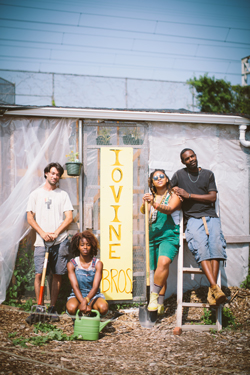 Alex Epstein, Troi Lauren Nichols, Jeannine Kayembe and Devon Bailey pose in front of the Iovine Brothers Produce greenhouse. PUC’s methods of educating and strengthening the North Philadelphia community are as varied as its funding sources. The farmers market program is a source of income, but its primary goal is introducing healthy eating to potential customers from the Philadelphia Housing Authority tenements across the street.
Alex Epstein, Troi Lauren Nichols, Jeannine Kayembe and Devon Bailey pose in front of the Iovine Brothers Produce greenhouse. PUC’s methods of educating and strengthening the North Philadelphia community are as varied as its funding sources. The farmers market program is a source of income, but its primary goal is introducing healthy eating to potential customers from the Philadelphia Housing Authority tenements across the street.
“We want to create that commerce of getting people used to buying organic food, because government food is ridiculous—the powdered milk, the cheese in the block,” Kayembe says. “The folks who live in the project aren’t used to buying local produce, and that’s something we want to try to turn around.”
She refers to the forces at work in a food desert as food injustice, a term she learned from the organizers at OSBG. When she discovered that the corner stores in blighted areas like the Lower Ninth Ward and North Philly receive food shipments that have been sitting on trucks for six months or more, she was shocked. “I realized, wow, they’re holding food back from people.”
And although the North Philadelphia residents under 25 might be more drawn to fast food, Kayembe says the older residents are asking for kale and collards and tomatoes and onions—soul food staples. Almost everybody in that neighborhood, she says, has been there for 40 to 50 years, and for the most part, the seniors and people with disabilities are forgotten. “I’ve seen people cry because everyone wants to feed the babies, nobody wants to feed the seniors,” she says.
PUC also runs a variety of after-school programs for juveniles who have already had run-ins with law enforcement. The organization is in its first few weeks of a pilot program with the Institute for Development of African American Youth (IDAAY), a local agency that works to provide at-risk youth with the skills they need to escape the pitfalls of inner-city life. For 15 weeks, teens in IDAAY’s Don’t Fall Down in the Hood program come to Life Do Grow after work to help plant, weed, paint, hammer, saw—and communicate.
IDAAY Executive Director Archye Leacock says that the team-building and problem-solving skills gleaned from urban farming are directly applicable to neighborhood life. If the teens can learn to work together, to respect each other and the land, to speak with others of all ages, they can be more productive members of their own communities.
Don’t Fall Down in the Hood Program Director Wesley Jones says, “A lot of our young men feel devalued, and they feel like they have no place in the community.” But in their work with PUC, he says, “they become part of the solution. They are helping transform a blighted area from start to finish, and that gives them a sense of satisfaction. It gives them confidence and helps them feel like part of the community.”
One project that IDAAY participants are currently working on involves establishing and maintaining satellite community gardens. Around the corner from PUC on Dakota Street, there had been an empty lot filled with chest-high weeds; 14 raised beds now grow buckwheat, onions, herbs and other vegetables. Neighbors from each house on the block are asked to choose a bed where they can grow whatever they’d like to harvest for meals at home. PUC helps teach the neighbors how to garden, and asks only that they continue to care for the crops on their own. A beehive tucked behind the garden houses pollinators to encourage biodiversity.
Leacock hopes that by the end of the program, the IDAAY crew will be able to bring homegrown produce back to the agency to cook family meals for participants. “From the moment of planting to the moment of eating,” he says, “what a success!”
Devon Bailey, PUC’s Site and Development Manager, offers both construction training and self-defense lessons as outlets for at-risk youth. In his warehouse across 11th Street from the farm, a punching bag dangles from the ceiling, and stacks of lumber and building materials line the walls. The neighborhood kids gravitate toward him as a former self-professed “corner boy” who began using his skills for good.
“I speak what I hear in my neighborhood,” Bailey says, “so when the young’uns come, they understand what I’m saying because everything is in hustle terms. Something as simple as compost, it’s a hustle, because I’ve got two parts that I’m getting for absolutely free. I put them together and I take care of them, and I wait a little bit of time, and guess what? Boom. I’ve got a profit.”
Bailey’s motivation for helping is simple: “It just feels like the right thing to do. There’s no thought process behind it; it’s just, ‘What are we doing next?’”
Blockparty, Hoodstock 2014
PUC hopes to take its model nationwide. The team has already established community gardens in New York, and worked with organizations like Growing Power for inspiration. Growing Power founder Will Allen established his first urban farm in Milwaukee in 1993, and began teaching neighborhood children how to grow healthy food. Today, Growing Power operates multiple farms in both rural and urban Wisconsin and Illinois, and last year it employed over 300 at-risk youth in urban agriculture and community food system development. Allen’s daughter, Erika Allen, met with PUC in Chicago, and Kayembe says that working with Growing Power helped PUC realize how great a responsibility it is to feed the community. The Urban Creators knew they needed to step up their outreach efforts, so this year, they’re hosting the first annual HoodStock.
On July 19, PUC will throw what they describe as “the largest cultural festival in North Philadelphia in over five decades.” Life Do Grow and its surrounding blocks will welcome traveling poetry festival Brave New Voices, the Philadelphia Youth Poetry Movement, the African American United Fund, Ignite Good, GrassROOTS Community Foundation (co-founded by Philadelphia hip-hop artists the Roots’ Black Thought) and other organizations. The day will begin at 8 a.m. with volunteer activities, including setting up backyard and balcony gardens at the Fairhill Apartments development across the street. Participants will also conduct a neighborhood cleanup, which will conclude by repurposing plastic bottles to make seedling and herb planters as party favors.
From 11 a.m. to 5 p.m., HoodStock will feature live music, art and storytelling circles, as well as free blood tests, dental exams and health education. Local vendors will showcase homemade jewelry and clothing, and PUC will offer a farmers market. Brave New Voices’ MC Olympics will take place at the festival, and Opera Philadelphia’s Marc Bamuthi Joseph will perform. Between 1,000 and 2,000 people are expected to participate.
“This is our coming-out ball,” Kayembe says. “I hope that HoodStock can show North Philadelphia and its leadership and council people that we’re a really large resource, and we have all these great ideas and we really know how to organize well.”
HoodStock could very well be the tipping point for PUC. The team is incredibly serious about its mission, and is ready to share it with a wider audience.
“This one thing, food, can literally cure every last one of the intangible crises,” Kayembe says. “Violence, hunger, health—people are violent because they’re hungry. People are shooting people because they haven’t eaten breakfast in so long. In this neighborhood, it feels like the walls are closing in, so of course you’re gonna want to explode out of that.”
And PUC is in it for the long haul. Bailey says, “I had somebody ask me, ‘How long are you willing to do this? Are you willing to put 20 years-plus into this?’ I am. I live here. This is my community. Hell yeah.”


